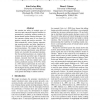16 search results - page 3 / 4 » Positive and negative verbal feedback for Intelligent Tutori... |
AAMAS
2010
Springer
13 years 7 months ago
2010
Springer
Abstract In this paper, we present a human-robot teaching framework that uses "virtual" games as a means for adapting a robot to its user through natural interaction in a...
AIED
2007
Springer
14 years 1 months ago
2007
Springer
Razzaq and Heffernan (2006) showed that scaffolding compared to hints on demand in an intelligent tutoring system could lead to higher averages on a middle school mathematics post-...
LWA
2007
13 years 9 months ago
2007
Serious games that should adapt training to the individual might benefit from methods that are developed for intelligent tutoring systems. One method, model tracing, might be used...
NAACL
2004
13 years 9 months ago
2004
We examine the utility of multiple types of turn-level and contextual linguistic features for automatically predicting student emotions in human-human spoken tutoring dialogues. W...
ATAL
2010
Springer
13 years 8 months ago
2010
Springer
As learning agents move from research labs to the real world, it is increasingly important that human users, including those without programming skills, be able to teach agents de...

